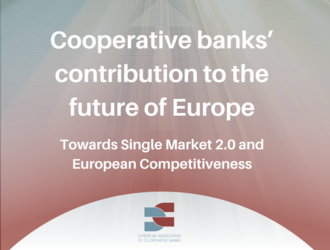Brussels, 31 May 2024 – The European Association of Co-operative Banks (EACB) has unveiled its Manifesto, outlining key recommendations for the upcoming EU legislative cycle 2024-2029. Titled “Cooperative Banks’ Contribution to the Future of Europe”, it emphasises fostering an environment that will allow Europe’s companies and citizens to reap the benefits of the cooperative banking model and contribute to a more competitive Europe and strong single market by 2029.
Europe faces an unprecedented need for massive investments to deliver sustainable growth, support the green transition, drive digital transformation and reinforce economic security and defence efforts. Approximately 1.5 trillion euros per year are estimated for the clean transition alone, necessitating significant private sector involvement through a blend of bank and capital market financing.
“To overcome these challenges, Europe needs a strong and diverse banking sector capable of serving both pan-European and more locally oriented economic activities and objects, alongside deep and liquid capital markets attracting - and retaining - European retail investors” stated Nina Schindler, Chief Executive Officer of the EACB.
Drawing on the expertise of EACB member banking experts across Europe, recommendations have been formulated to unlock the full potential of cooperative banks in advancing Europe’s green, digital and strategic autonomy objectives. These proposals include fostering a European fabric of thriving and innovative companies of all sizes, and devising policies to ensure that cooperative banks can continue to meet investment demands and varying economic realities of European regions and citizens.
Discover the key policy recommendations outlined in the Manifesto to ensure cooperative bank’s contribution:
- to strong European regions and local communities and a financially inclusive Europe
- to a strategically autonomous Europe and a strong internal market
- to a strong European financial system taking advantage of what Europe’s banks and financial markets can offer
- to a sustainable European economy and a resilient agricultural sector
- to an innovative and digital, yet fair Europe




